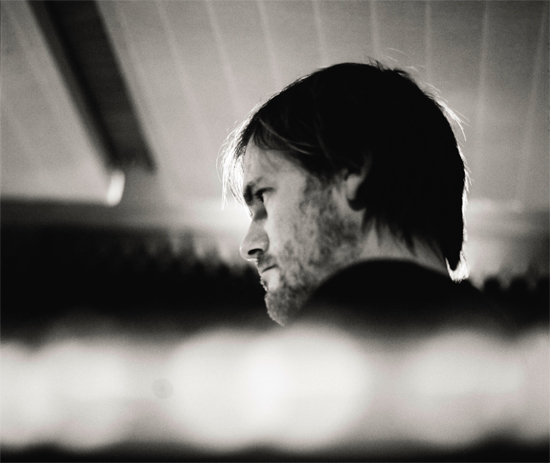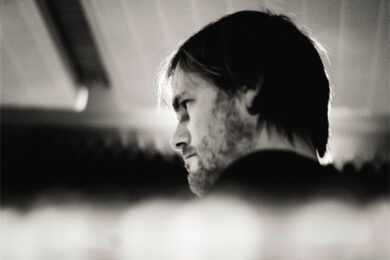Hard work clearly suits Geoff Barrow. Although the fourth Portishead long
player is still somewhere way off in the distance, Barrow’s industrious streak
has brought forth a trio of distinct album projects. Due to see the light of day this
spring, each of these three releases offers a unique reflection of Barrow’s personal
musical influences.
As well as Beak>’s hypnotic post-Krautrock skronk and the
Judge Dredd-inspired, John Carpenter-on-a-meth-comedown Drokk, there’s
Quakers. A hugely ambitious hip hop project, based around the trio of Barrow, Katalyst and 7-Stu-7 and featuring dozens of rappers both known and unknown, their debut album Quakers saw the light of day last month. Consisting of 41 tracks – many of which are short and intensely focused – it unfolds in the swift manner of a mixtape, and features guest appearances from legends like Dead Prez and The Pharcyce’s Booty Brown, as well as a host of previously unknown MCs.
Released on the hugely influential West Coast label Stones
Throw, it’s the first time Barrow has explicitly explored the music he grew up
with. The Quietus caught up with Barrow to talk about the project, its genesis and how the album came together via MySpace, "back when it worked".
At forty one tracks, Quakers seems like a hugely ambitious record. How did it
come together?
Geoff Barrow: The three of us – me (aka Fuzzface), Stuart (7-Stu-7, Portishead’s studio
manager) and Ashley Anderson (Katalyst from Sydney) – all spent our formative
years immersed totally in hip hop. For each of us, that was our punk. We decided
that before we got too old, we’d make a hip hop record. It’s taken us about
four years on and off, sessions recorded in between other projects we’ve been
working on. We didn’t want to go down the route that a lot of producers do
where you end up hiring in a load of big name MCs to make something look
impressive. Our idea was to try to get as far away as possible from that, so a
couple of years ago we each spent a load of time on MySpace, back when it still
worked. Usually, we’d sit there drinking a load of bottles of wine rinsing MySpace
to try to find MCs. We were really into discovering new people, good new people,
wherever they might be from. We had to do that because, obviously, there was
no possible chance that we’d be able to rap ourselves.
So it was put together ‘guerrilla’ style?
GB: Yeah, we really didn’t want to do that whole thing of going through managers
and I made sure that the word Portishead wasn’t associated with it at all. We
set up our own MySpace and got in touch with people then sent them our beats.
We said if you want to jump on them, you’ll get all the publishing, we won’t own
anything of yours. A lot of people came back immediately saying that they loved
the beats and wanted to get involved. It really focused the record and highlighted
one of things that I’ve always loved about hip-hop. That was basically, “Is it a
good fucking beat?” and “Can you rap?” That’s pretty much all it should be about.
Was the intention to make the album move like a mixtape?
GB: The main reason the tracks are short is because we get bored really easily. The
record was obviously never going to be a big sermon by just one MC so we kept
things really short. I love the fact that when you go to a good hip-hop club, there
would be so many brilliant tunes to play that when a DJ was on often, he’d be
onto the next one after the first chorus. You’d have the intro, a verse, a chorus
then the DJ would drop another tune. As a hip-hop fan that really becomes like
a drug; you’re waiting for what’s coming next. So that was part of the way we
set the record up. It’s not so much like a mixtape, it’s not trying to make people dance in that way but it’s got the same rapid-fire thing. Lots of hip-hop music is
about big choruses. With this, the main point was how heavy the beat was.

Was it intentional to have an international feel (at one point, you get West Coast
next to West Country)?
GB: Maybe because it was born on MySpace, it really felt to me like a record with
no country. One of the most interesting things is that none of the MCs have ever
met each other. There’s very little personal contact. No one who committed to
it had any idea that the record was coming out on Stones Throw. If people came
on board, it was purely because they liked the beats. You’ve got some pretty
hardcore guys on there, some heavyweight talent. And you’ve got people who’ve
never rapped on records before.
Like who?
GB: FC The Truth… the Coin Locker Kid. I think he’d done some demos, certainly
hadn’t had a record out when we got in touch. Again, we just found him through
MySpace. As I said, that was back when it worked.
So you got in there, hammered it and got out when it died?
GB: Absolutely. We stripped it. We broke it.
One of the most addictive things about the record is the rumbling feeling of
psychedelia that’s all over it. Was that intentional?
GB: It is very intentional. For me personally, hip hop that just goes by the rulebook
is really boring. The purists can keep it. There’s so many different styles at the
moment… There’s the whole Dungeons and Dragons side of it…
Are you serious?
GB: Yeah, there is. It’s people rapping about space-aged shit. It’s not about the street,
it’s real egghead stuff. On the other side, you’ve got proper young black America,
ghetto kids. And you’ve got real party stuff. It’s very much like jazz. It’s hugely
divided. Back to the psychedelia though, I think that sound comes from working
with different sample sources. As a label, Stones Throw have a history of working
with artists who’ve sampled psychedelic records – Edan, Madlib, for two. When
we were making beats, we concentrated more on that stuff than traditional
sample sources like soul records.
Is there a natural crossover between this and the other musical projects you’re
working on?
GB: Yeah, definitely. There’s elements of both Drokk and Beak> on the Quakers
record. We actually cut up a Beak> track for an MC to rap over and there’s a
track called The Russian that Beak> recorded that’s almost a cover version of the
Quakers track that the Coin Locker Kid rapped on. The Drokk album definitely crosses over too. Psychedelic rock, soundtracks, synth stuff, experimental
records… that’s kind of what got all three of us going.
So is this glut of releases you making up for lost time between Portishead LPs?
GB: Yeah, the creativity has allowed me to work on Portishead. As it happens, I’ve
got three records – Quakers, Drokk and Beak> – each released one month after the
other. They were recorded over longer periods of time – Quakers was written
four years ago, Drokk was written over six months and Beak>’s been done over
the last two years – but it’s ended up that they’re all coming out in a line. When
they’re all out, it’s back onto Portishead.
Is the relationship with Stones Throw something that’s gone back a while?
GB: I’m a big fan of a lot of stuff they do. I met Chris from Stones Throw back in ’98
and became friends more recently. They released the Anika record that I put out
on Invada. Since running that label, I’ve ended up having a lot in common with
them. At the moment it seems like there’s so much music out there, you have
to reach out to people almost in an outsider way. Sometimes it’s a real struggle
to compete with bigger labels; people who are successful in the music business
now are usually the best at talking shit and pushing out the most awful, middle
of the road music. Anything too different isn’t going to sell, so people just aren’t
interested in pushing it. Stones Throw has the right kind of indie mentality,
one that’s absolutely not tied up in money and that’s great for us. Stones Throw
have always come through with a slightly wonky eyed view of hip-hop, and that’s
something I’ve always really loved.



